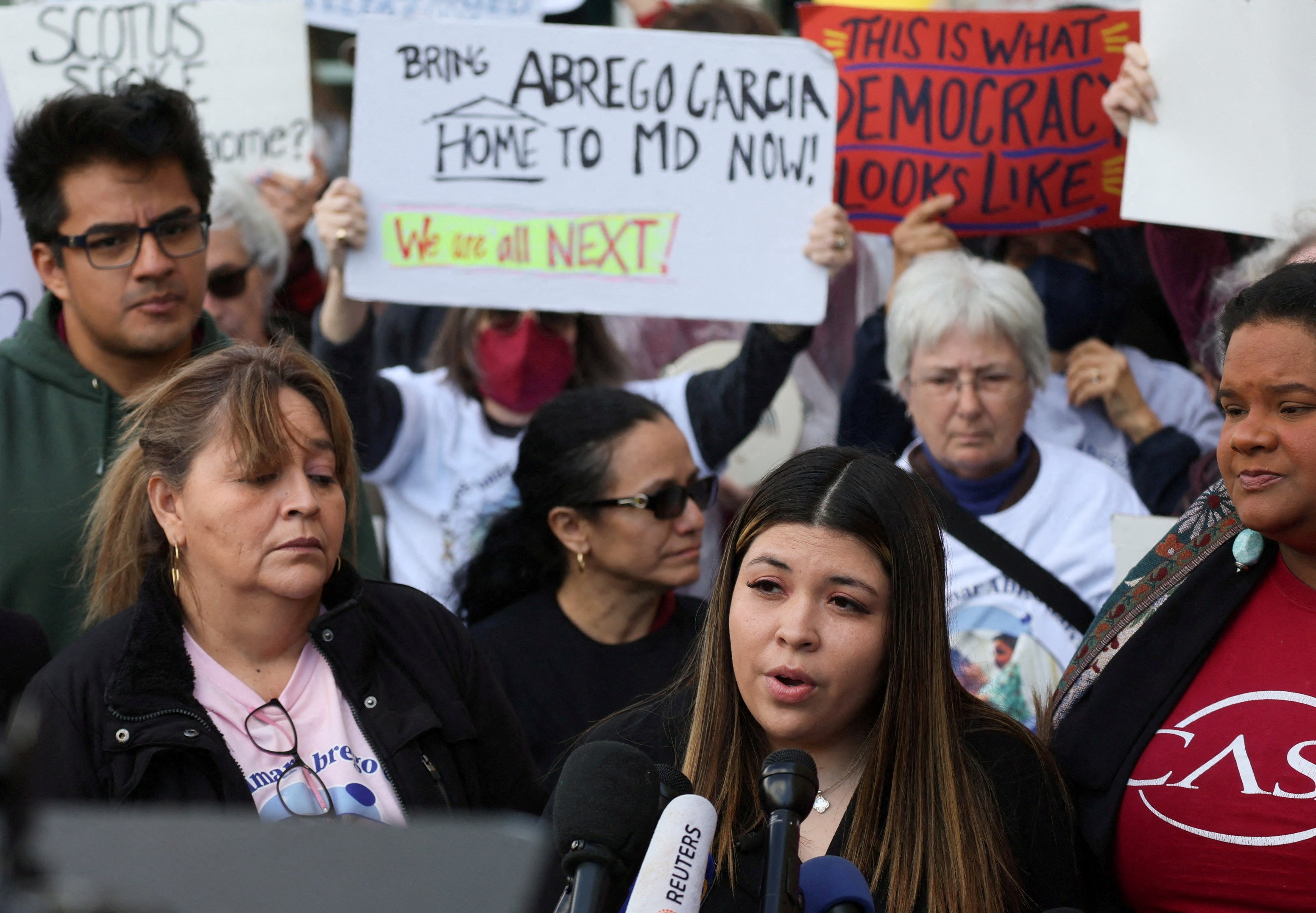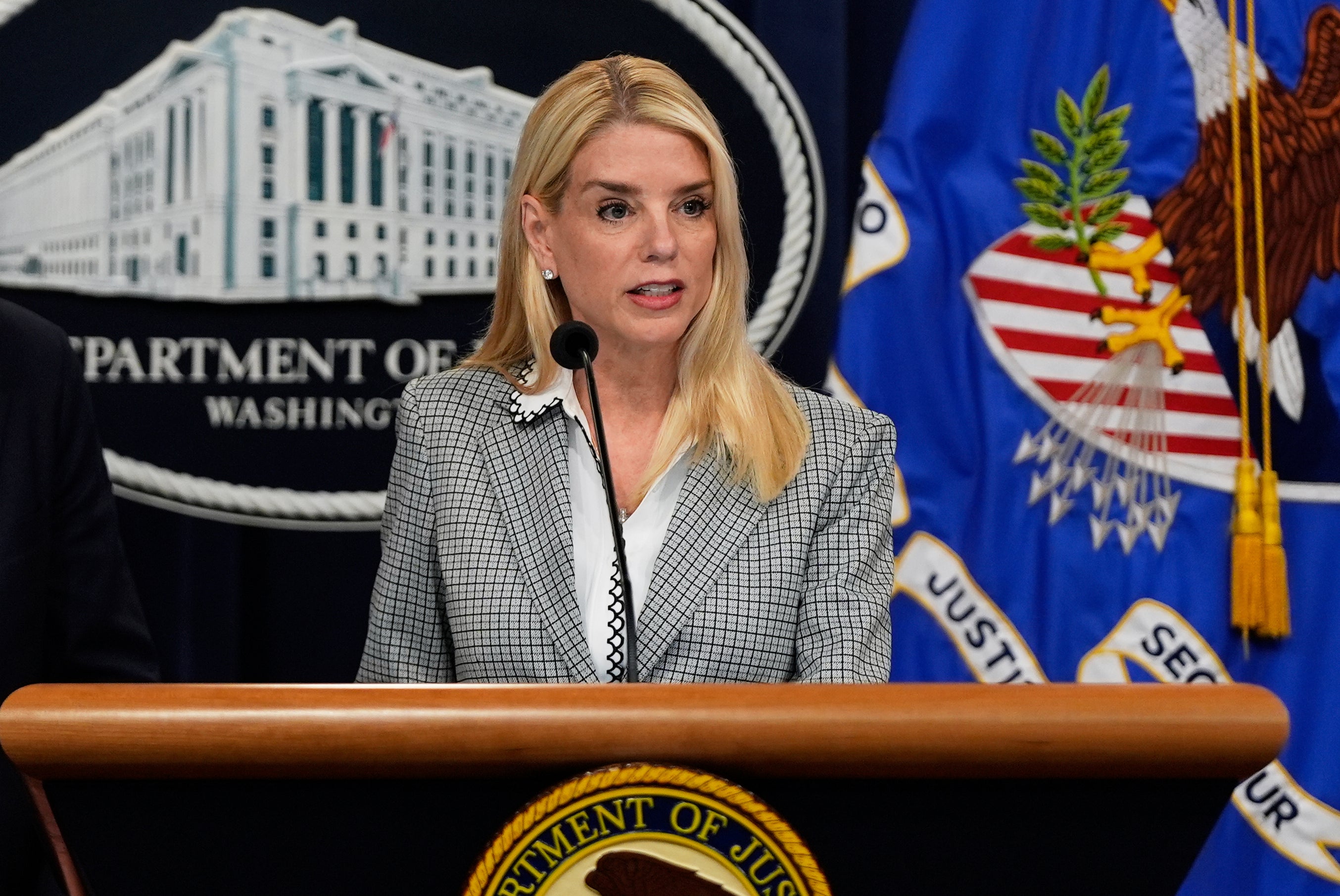Kilmar Abrego Garcia returns to US to face criminal smuggling charges
Wrongfully deported Salvadoran immigrant faces grand jury indictment over trafficking allegations.

More than two months after Donald Trump’s administration was ordered to “facilitate” the return of Kilmar Abrego Garcia, the wrongfully deported Salvadoran man has returned to the United States to face criminal charges in Tennessee.
The government has spent weeks battling court orders for his return after admitting he was deported in error. The 29-year-old Maryland father is now facing a federal grand jury indictment accusing him of illegally transporting undocumented immigrants across the country.
A two-count indictment filed in Tennessee last month and unsealed Friday accuses Abrego Garcia of participating in a years-long conspiracy to traffic undocumented immigrants from Texas. He faces one count of conspiracy to transport aliens and one count of unlawful transportation of undocumented aliens.
Federal prosecutors claim he is a member of transnational gang MS-13 and “personally participated in violent crime, including murder.” Prosecutors also claim he “abused” women and trafficked children, firearms and narcotics. There is also an ongoing investigation into “solicitation of child pornography,” though no charges have been filed, prosecutors said.
A decision to pursue a case against Abrego Garcia led to the abrupt departure of top prosecutor Ben Schrader, who feared the charges were politically motivated, according to ABC, which first reported the indictment.

“The government disappeared Kilmar to a foreign prison in violation of a court order. Now, after months of delay and secrecy, they’re bringing him back, not to correct their error but to prosecute him,” his attorney Simon Sandoval-Moshenberg said in a statement to The Independent.
“This shows that they were playing games with the court all along,” he added. “Due process means the chance to defend yourself before you’re punished, not after.”
The case stems from a traffic stop in Tennessee in 2022, when police found Abrego Garcia driving several other men who lacked identification, according to the indictment. He was not charged at the time.
Allegations from six unnamed co-conspirators claim Abrego Garcia helped move migrants throughout the country in exchange for money that was moved between them in an alleged effort to hide their origins.
Abrego Garcia and his alleged co-conspirators “knowingly and unlawfully transported thousands” of people, some of whom were members of MS-13, according to the indictment.
Federal prosecutors have asked a judge to hold him in pretrial detention “because he poses a danger to the community and a serious risk of flight.”
“Testimony at trial will establish that the defendant transported approximately 50 undocumented aliens throughout the United States per month for several years,” according to prosecutors. “The evidence will also establish the defendant’s longstanding membership and association with MS-13 and how he used his association with the gang to further the alien smuggling conspiracy.”
In a press conference on Friday, Attorney General Pam Bondi called his indictment and arrest “American justice.”
If convicted, he will be deported back to El Salvador, she said.

Abrego Garcia fled El Salvador as a teenager in 2011 and was working as a sheet-metal apprentice in Maryland, where he has been living with his wife and 5-year-old child, both U.S. citizens. The couple is also raising two other children from a previous relationship.
After a traffic stop in March, he was detained by Immigration and Customs Enforcement and then deported to El Salvador’s brutal Terrorism Confinement Center despite an immigration court judge’s 2019 order withholding his removal from the country for humanitarian reasons. Abrego Garcia was later moved to another prison for non-gang members. He was imprisoned in the country for nearly three months.
Trump’s allies and administration officials have repeatedly sought to justify his detention over allegations of criminal activity and MS-13 gang membership, which were raised only after he was summarily deported. Democrats and legal analysts have argued the administration could simply return Abrego Garcia and then use that alleged evidence against him in normal immigration court removal hearings.
Instead, Justice Department lawyers and Trump administration officials clashed with federal judges and raised a “state secrets” privilege to avoid answering a judge’s questions about the government’s relationship with El Salvador and conversations about his detention there.
“This is an abuse of power, not justice,” Sandoval-Moshenberg toldThe Independent.
“The government should put him on trial, yes — but in front of the same immigration judge who heard his case in 2019, which is the ordinary manner of doing things, ‘to ensure that his case is handled as it would have been had he not been improperly sent to El Salvador,’ as the Supreme Court ordered,” he said.
Maryland Senator Chris Van Hollen, who traveled to El Salvador to meet with Abrego Garcia, said the administration appeared to have “finally relented to our demands for compliance with court orders and with the due process rights afforded to everyone in the United States.”
“As I have repeatedly said, this is not about the man, it’s about his constitutional rights — and the rights of all,” he said Friday. “The administration will now have to make its case in the court of law, as it should have all along.”

Following a legal challenge over his arrest and deportation in mid-March, government attorneys conceded in court documents that Abrego Garcia was removed due to “administrative error” but insisted it was impossible to bring him back. White House press secretary Karoline Leavitt also said he was removed due to a “clerical error.” But the president and other administration officials have repeatedly defended his detention.
In April, Maryland District Judge Paula Xinis ordered the administration to “facilitate” Abrego Garcia’s return from El Salvador, calling the removal “wholly lawless” and a “grievous error” that “shocks the conscience.”
“As defendants acknowledge, they had no legal authority to arrest him, no justification to detain him, and no grounds to send him to El Salvador — let alone deliver him into one of the most dangerous prisons in the Western Hemisphere,” Judge Xinis wrote at the time.
The Supreme Court also unanimously agreed that his removal was “illegal” and affirmed the lower court judge’s order to “facilitate” his return.
Officials continued to reject those orders and insisted Abrego Garcia would never return to the United States, escalating the Trump administration’s ongoing battle with a judiciary the president accuses of conspiring against him.
“There is no scenario where Abrego Garcia will be in the United States again,” Homeland Security Secretary Kristi Noem testified to a Senate panel last month.


